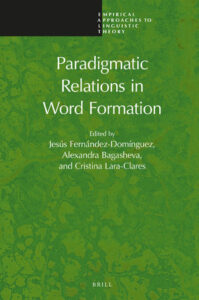 Jesús Fernández-Domínguez, Alexandra Bagasheva y Cristina Lara Clares (eds.)
Jesús Fernández-Domínguez, Alexandra Bagasheva y Cristina Lara Clares (eds.)
Paradigmatic Relations in Word Formation brings together contributions that aim to discuss the nature of paradigms in derivational morphology and compounding in the light of evidence from various languages.
Among others, the topics considered in the volume include the interconnectedness between derivational families and paradigms, the constitutive characteristics of a word-formation paradigm, the degree of predictability of word-formation paradigms, and the specificity of paradigms depending on the variety of recognised word-formation processes and patterns.
Table of Contents:
What Paradigms and What For? By: Jesús Fernández-Domínguez, Alexandra Bagasheva, and Cristina Lara-Clares Pages: 1–20
Paradigmaticity in Compounding By: Alexandra Bagasheva Pages: 21–48
Characterizing Derivational Paradigms By: Bernard Fradin Pages: 49–84
The Level of Paradigmaticity within Derivational Networks By: Petr Kos Pages: 85–99
Doublet Formation in Palestinian Arabic—Where Do Paradigms Interfere? By: Lior Laks and Faten Yousef Pages: 100–127
What We Talk about When We Talk about Paradigms: Representing Latin Word Formation By: Eleonora Litta and Marco Budassi Pages: 128–163
A Paradigmatic Approach to Compounding By: Jan Radimský Pages: 164–185
Of Brownie Girls and Aussie Families: A New Look at Morphosemantic Paradigmaticity in Adj+ie/y Nominalisations By: José A. Sánchez Fajardo and Elizaveta Tarasova Pages: 186–212
Neoclassical Word Formation in English: A Paradigm-Based Account of -scope Formations By: Ana Díaz-Negrillo Pages: 213–261
Ed.: Brill
Year: 2020
ISBN: 978-90-04-43340-3 (Hardback), 978-90-04-43341-0 (EPub)
Comprar: 99 €